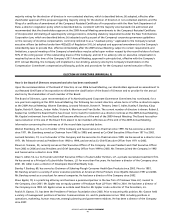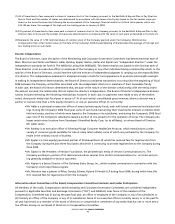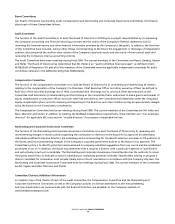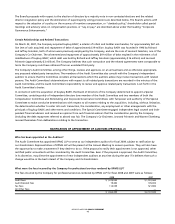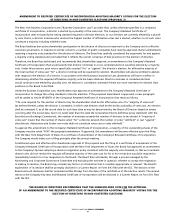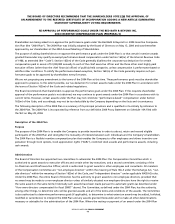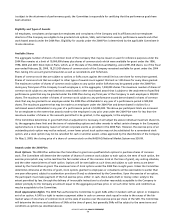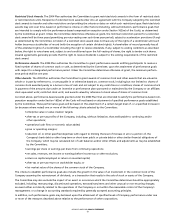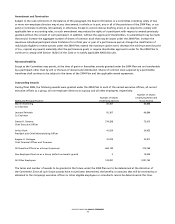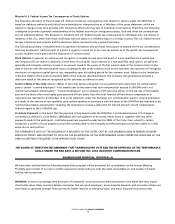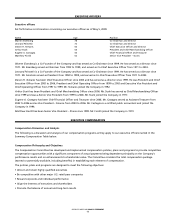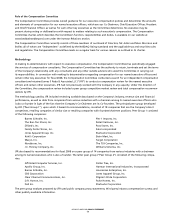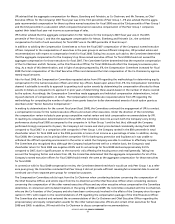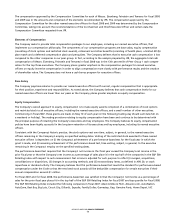Bed, Bath and Beyond 2008 Annual Report Download - page 51
Download and view the complete annual report
Please find page 51 of the 2008 Bed, Bath and Beyond annual report below. You can navigate through the pages in the report by either clicking on the pages listed below, or by using the keyword search tool below to find specific information within the annual report.
BED BATH & BEYOND PROXY STATEMENT
49
THE BOARD OF DIRECTORS RECOMMENDS THAT THE SHAREHOLDERS VOTE FOR THE APPROVAL OF
AN AMENDMENT TO THE RESTATED CERTIFICATE OF INCORPORATION ADDING A NEW ARTICLE ELIMINATING
STATUTORY SUPERMAJORITY VOTING REQUIREMENTS.
RE-APPROVAL OF PERFORMANCE GOALS UNDER THE BED BATH & BEYOND INC.
2004 INCENTIVE COMPENSATION PLAN (PROPOSAL 5)
Shareholders are being asked to re-approve the performance goals under the Bed Bath & Beyond Inc. 2004 Incentive Compensa-
tion Plan (the “2004 Plan”). The 2004 Plan was initially adopted by the Board of Directors on May 13, 2004 and was thereafter
approved by our shareholders at the 2004 Annual Meeting of Shareholders.
The purpose of asking shareholders to re-approve the performance goals under the 2004 Plan is so that certain incentive awards
granted thereunder may qualify as exempt performance-based compensation under Section 162(m) of the Internal Revenue Code
of 1986, as amended (the “Code”). Section 162(m) of the Code generally disallows the corporate tax deduction for certain
compensation paid in excess of $1,000,000 annually to each of the chief executive officer and the three other most highly paid
executive officers (other than the chief financial officer) of publicly-held companies, unless compensation is performance-based or
satisfies other conditions. To satisfy the performance-based exception, Section 162(m) of the Code generally requires such per-
formance goals to be approved by shareholders every five years.
We are not proposing any amendment to the terms of the 2004 Plan at this time. These performance goals must be shareholder
approved to preserve, to the extent possible, our tax deduction for certain awards made under the 2004 Plan in accordance with
the terms of Section 162(m) of the Code and related regulations.
The Board recommends that shareholders re-approve the performance goals under the 2004 Plan. If the requisite shareholder
approval of the performance goals is not obtained, we may continue to grant awards under the 2004 Plan in accordance with its
current terms. However, certain awards under the Plan may not constitute “performance-based” compensation under Section
162(m) of the Code, and accordingly, may not be tax deductible by the Company depending on the facts and circumstances.
The following description of the 2004 Plan is a summaryof its principal provisions and is qualified in its entirety by reference to
the 2004 Plan. The 2004 Plan is incorporated by reference from our definitive 2004 Proxy Statement on Schedule 14A filed with
the SEC on May 28, 2004.
Description of the 2004 Plan
Purpose
The purpose of the 2004 Plan is to enable the Company to provide incentives in order to attract, retain and reward eligible
participants of the 2004 Plan and strengthen the mutuality of interests between such individuals and the Company’s shareholders.
The 2004 Plan is a flexible incentive compensation plan that enables the Company to offer employees and others incentive com-
pensation through stock options, stock appreciation rights (“SARs”), restricted stock awards and performance awards, including
cash awards.
Administration
The Boardof Directors has appointed two committees to administer the 2004 Plan: the Compensation Committee which is
authorized to grant awards to executive officers and certain other key executives; and a second committee, consisting of the
Co-Chairmen and Chief Executive Officer, which is authorized to grant awards to other employees and consultants. All members
of the Compensation Committee are “non-employee directors” within the meaning of Rule 16b-3 under the Exchange Act, “out-
side directors” within the meaning of Section 162(m) of the Code, and “independent directors” under applicable NASDAQ rules.
Under the 2004 Plan, the entire Board of Directors has the authority to grant awards to non-employee directors, provided that
no awardmay be made to a non-employee director unless all similarly situated non-employee directors have the right to receive
the same awardon the same terms; historically such awards have been made pursuant to automatic grants (as described under
“How were directors compensated for fiscal 2008?” above). The Committee, as defined under the 2004 Plan, has the authority,
among other things, to determine who will be granted awards and all of the terms and conditions of the awards. The Committee
is also authorized to determine performance goals (if applicable), to determine to what extent an award may be settled, forfeited,
modified or surrendered, to interpret the 2004 Plan and any awards granted thereunder and to make all other determinations
necessary or advisable for the administration of the 2004 Plan. Where the vesting or payment of an award under the 2004 Plan




